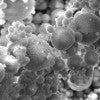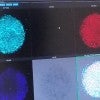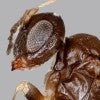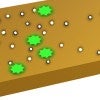
Physicists find evidence of new quantum phase
Rice physicists collaborated on the discovery of a quantum phase that appears to break time-reversal symmetry.

Physicists find evidence of new quantum phase
Rice physicists collaborated on the discovery of a quantum phase that appears to break time-reversal symmetry.

Rare earth elements await in waste
Rice University scientists applied their flash Joule heating process to coal fly ash and other toxic waste to safely extract rare earth elements essential to modern electronics and green technologies.

Matthew Jones wins NSF CAREER Award
Rice chemist Matthew Jones wins an NSF CAREER Award to study controlled growth of metallic nanoparticles for biomedicine, energy storage and computing.

Machine learning fine-tunes flash graphene
Rice University scientists are using machine learning techniques to streamline the process of synthesizing graphene from waste through flash Joule heating.

Now you don’t see it … and now you do
Scientists and engineers from Rice University and the Kuwait Institute for Scientific Research discover fluorescence from silicon nanoparticles in cement and show how it can be used to reveal early signs of damage in concrete structures.

‘Lefty’ tightens control of embryonic development
A protein known as Lefty pumps the brakes as human embryos begin to differentiate into the bones, soft tissues and organs that make us.

Biologists discover new insect species at Rice University
Newly discovered insect Neuroterus valhalla is barely a millimeter long and spends 11 months of the year locked in a crypt. It’s legendary sounding name stems from where it was discovered: A tree outside Rice’s graduate student pub Valhalla.

Black and Hispanic communities bore disproportionate share of Texas’ early COVID-19 deaths
Texas state officials did not publish the race and ages of COVID-19 victims in early 2020, but a county-level statistical analysis spearheaded by Rice University undergraduates in collaboration with university faculty has found deaths statewide were disproportionately concentrated in Black and Hispanic communities.

When graphene speaks, scientists can now listen
Brothers working in a lab at Rice University discover that sound can be used to analyze the properties of laser-induced graphene in real time.

Relax, marathoners, we’ve got your back
Rice’s Sports Medicine and Exercise Physiology student club helped provide more than 400 post-race medical massages to runners at the 2022 Chevron Houston Marathon.

Halting antibiotic resistance is a little less futile
Rice University bioscientists develop a microfluidic platform for high-throughput studies of how bacteria evolve antibiotic resistance.

Rice physicist Pengcheng Dai wins superconductivity award
Rice University physicist Pengcheng Dai and two European physicists have won the 2022 Heike Kamerlingh Onnes Prize, one of the leading awards for experimental research in superconductivity.

NSF funds Rice effort to measure, preserve quantum entanglement
Rice University physicist Guido Pagano has won a prestigious CAREER award from the National Science Foundation (NSF) to study quantum entanglement and develop new error-correcting tools for quantum computation.

Migrating holes help catalysts be productive
A theoretical model suggests electron holes that propagate at active sites on a catalyst migrate, triggering other sites that continue the process.

Jo Nelson wins NSF CAREER Award
Rice University mathematician Jo Nelson wins a National Science Foundation CAREER Award for young faculty.